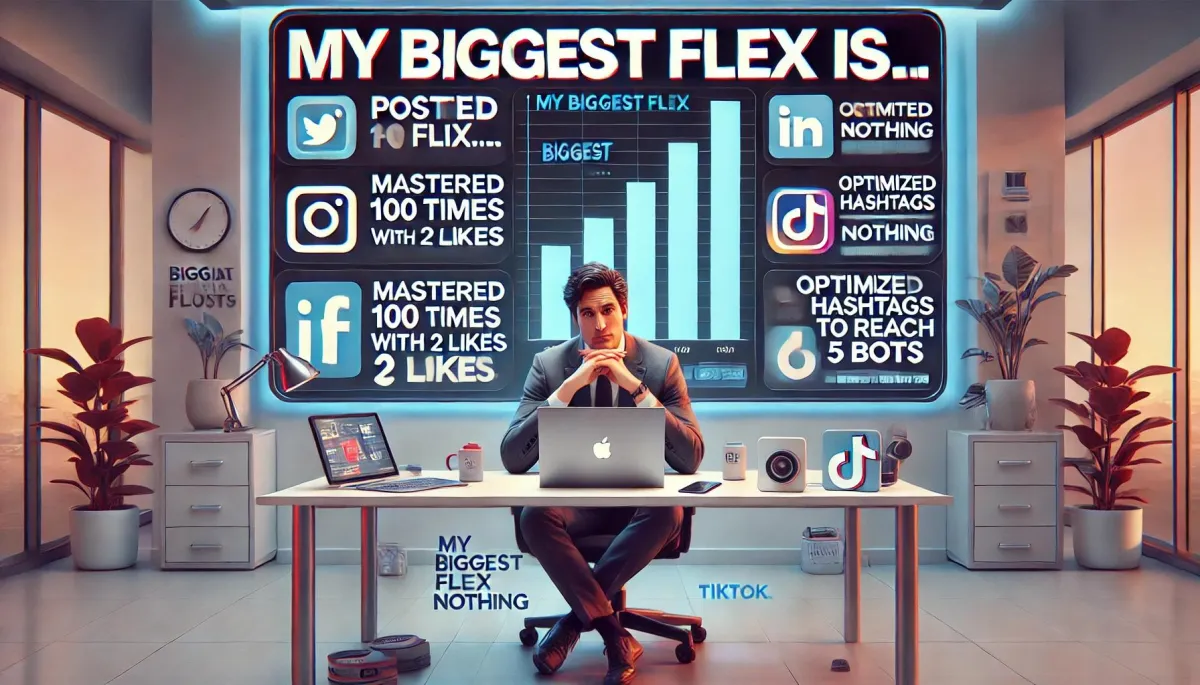Online Marketing Tips Blog
In this Daily blog, I'll try to answer the most burning questions for online marketing that I get in my consulting business. We help online business owners who are in affiliate marketing, coaching, eLearning and Online Events every single day. I'll share that info with you!

"My Biggest Flex Is…": Does Self-Deprecating Posting Actually Work?
When scrolling through social media, it's hard to miss posts that start with phrases like "My biggest flex is…" or "Not to brag but…". These expressions, often paired with seemingly self-deprecating humor, have become a staple in online marketing attempts, particularly among entrepreneurs, influencers, and brands. But what happens when this humblebragging takes a wrong turn?
While self-deprecating humor has the potential to be relatable and engaging, when used as a vehicle to covertly boast, it often backfires. Lines like "My biggest flex is helping 100 people this month earn $10k" might be intended to inspire, but to most audiences, they come off as disingenuous or condescending. For digital marketers, the question remains—does this strategy work, or does it risk alienating your audience?
This post dives into the role of self-deprecating humor in digital marketing, why misuse can harm your brand’s image, and how to leverage authenticity to truly connect with your audience.
What Is Self-Deprecating Posting, and Why Do People Use It?
At its core, self-deprecating humor revolves around poking fun at yourself. It shows humility and humanizes the person or brand behind the content. When done authentically, it makes your audience feel like you aren't taking yourself too seriously.
Self-deprecating content had its viral heyday with tweets and captions along the lines of “Too relatable 🫠," giving brands and influencers an approachable image. For digital marketers, this tone of humor is appealing because it breaks through the polished facade of social media, where everyone appears “perfect."
However, the real pitfall is when this turns into a “humblebrag.” This is where the humor feels like an afterthought to masking self-promotion, and the line between relatability and arrogance becomes blurred.
If your punchline starts with "My biggest flex is…” before sliding into an obvious achievement (e.g., “helping 10 people earn $1M in 3 months”), your audience is likely to see through the act—and tune out.
Why People Use Self-Deprecating Posting in Marketing
• Relatability: Humor related to our flaws and missteps resonates because it mirrors human experience.
• Approachability: A self-aware, "we're just like you" tone can make brands or influencers appear more personable.
• Engagement Boost: Audiences are more likely to engage with, share, or comment on humorous or light-hearted content.
• Viral Potential: Relatable, funny posts can easily find traction with a broad audience.
The problem arises when marketers fail to match the intent (humor) with audience perception (hidden arrogance).
When Self-Deprecation Turns Into Misstep Bragging
Think about the statement, "My biggest flex is helping 100 people this month earn $10k." While it might be true and even an admirable achievement, it doesn’t land as self-deprecating because the phrasing feels boastful. It also risks alienating your audience for a few reasons:
1 Disingenuousness:
The supposed “flex” doesn’t truly make fun of oneself. Instead, it serves as a platform to broadcast substantial success, which your audience may perceive as insincere or tone-deaf.
2 Condescension:
Bragging wrapped in self-deprecation can seem dismissive, unintentionally signaling that you’re unaware of your privilege, skills gap, or the barriers others face in achieving similar results. Consumers and audiences are increasingly wary of content that feels out of touch with their reality.
3 Loss of Relatability:
The initial intent of self-deprecating humor is lost on audiences who can’t relate to financial milestones or big wins being flaunted as a “quirk.” Instead, they’ll see it for what it is—a brag.
Examples of Misstep Bragging
• "Haha, I’m so bad at this but somehow made $500k this quarter!"
→ Humblebrag detected. This doesn’t feel self-deprecating; it can come across as patronizing.
• "My biggest flex is surviving on only three cups of coffee a day while helping 50 clients launch their dream businesses."
→ Your audience is more likely to eye-roll than praise such an obviously covert humblebrag.
While showing success shouldn’t be taboo, it’s critical to deliver these messages without attempting to veil them in humor or self-deprecation.
How to Authentically Use Self-Deprecating Humor
When done right, self-deprecating humor doesn’t just evoke laughter—it establishes trust and relatability. If your goal is to connect with audiences without coming off as boastful, here’s how you can pull it off:
1. Start With Real Vulnerability
Real self-deprecation stems from a genuine admission of imperfections or challenges. Don’t overthink or oversell it—talk about a silly mistake, ongoing learning, or even your occasional clumsiness. Authenticity is key.
Example: "I spilled coffee on my computer while trying to put together your latest marketing tips. Thankfully, the coffee survived even if my pride didn’t."
2. Make the Punchline About You, Not Them
Redirect the humor inward instead of inadvertently diminishing your audience’s experiences. Frame your quirk or flaw as something relatable rather than using it as a way to compare success.
Example: "My biggest flex is typing ‘definately’ 10 times a day. Thank goodness for spell check!"
3. Context Matters
Self-deprecating humor works best in casual, lighthearted contexts—like social media, blogs, or memos. Avoid using it in places where professionalism is key, as it could be perceived as unfit or insincere.
Keep in mind: Self-deprecating humor doesn’t diminish your authority. Just be careful where and how you use it.
4. Focus on Connection, Not Figures
Instead of fixating on metrics or wins, focus on shared experiences that strengthen your relationship with the audience. Free yourself from showing off.
Example: "Spoiler alert—I’m terrible at remembering my Wi-Fi password when every client seems to ask for it. Anyone else?"
When to Skip Self-Deprecation
Self-deprecating humor might not be for every audience or campaign. Consider avoiding it when:
• You’re addressing serious matters or highly professional settings.
• Your audience might not fully understand sarcasm or dry humor due to language preferences or cultural nuances.
• The topic focuses on highlighting your expertise or authority.
You don’t always need humor to stand out. There are countless ways to engage with your audience authentically while playing to your strengths—not by downplaying them.
The Bottom Line for Digital Marketers
Self-deprecating humor is an optional, yet powerful, tool in your content marketing toolbox. When used with good intentions and executed authentically, it fosters strong connections and boosts relatability. However, the moment humor becomes a vessel for veiled bragging, it can erode authenticity and push your audience away.
Instead of attempting “My biggest flex is…” posts as low-effort engagement, consider crafting meaningful content that reflects your achievements in a more authentic and direct way. Your audience will appreciate the honesty—and connect with your brand on a more meaningful level.
Want to fine-tune your brand’s voice? Check out our flagship training. It can help you get started in High Ticket Affiliate Marketing, eLearning & Courses, Events and Masterminds, along with Coaching. These Core Four businesses allow digital marketers to earn online. We can get you started for just $5 with a 5 Day Challenge, and if you are not satisfied, we’ll give you BACK your money!
Listen to a Podcast Review of this system as well.
Disclaimer: If you click on links we provide and make a purchase, we may receive compensation. There is never any guarantee of income in any of the links or programs we provide.
If you have specific questions you would like to see answered in this blog, please send them to me at [email protected]. I will try to address every question here.
If you follow the links in my blog, some of them will be affiliate links and I will be compensated if you purchase a course or product from these links. This is no way increases your price or changes my opinion on these courses. I only recommend things I use in my business.
For the absolute best training online for Affiliate Marketing, Coaching, Events & Masterminds and eLearning - Online Courses: Check out our Flagship Program Here.

Copyright © 2025 | All Affiliate Cash | All Rights Reserved
There may be affiliate links on these pages. When you follow them and purchase something, I may be paid a commission. This does not raise your cost of the item, and does not influence my opinion or review of the item in any way.
NOT FACEBOOK™: This site is not a part of the Facebook™ website or Facebook Inc. Additionally, This site is NOT endorsed by Facebook™ in any way. FACEBOOK™ is a trademark of FACEBOOK™, Inc.

